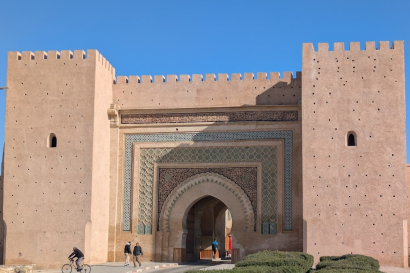
Morocco is colorful to all of the senses. The element I focus on most in this video is sound. There are two sound resources in this video, and they are both original recordings I have made in Rabat. The first recording is a Zohar, the call to prayer that happens around the middle of every day. I absolutely love the calls to prayer. For those of you new to Islam, payer is one of the five pillars (tenants) of Islam. Muslims prey five times a day, every day. In Muslim countries, the Imam at the local mosque will “call” local Muslims to pray on a loud speaker. In very dense muslim areas like the Rabat Medina, you will hear dozens of Imams’s calls overlapping on one another… and the collage of sound is breathtaking. Sometimes, the calls will harmonize for a second. There is often variation in how Imams do their calls. Though they all mean to start at the same minute, none of them start at the same time. If I had better sound recording equipment, I would love to record the calls again. The recording in this video is on my iPhone, which gives just a sonic taste of the true semi-accidental masterpiece of the Rabat medina calls to prayer.
My first very intimate and profound experience with Muslim culture/practice was the first time I had ever heard a call to prayer, about a year and a half ago when I went on my birthright trip. Our guides took us to the green line, where we entered a Palestinian neighborhood. We climbed to the top of an old building and looked out onto Palestine, when the Zohar boomed. I was scared, but when someone explained to me what the loud speaker was saying, I was so dazzled. It was such a beautiful sound with such a beautiful meaning. I knew then that I must one day return to this call to prayer. And now I am back in the Muslim world, and I hear the five calls every day. My favorite happens to be the Zohar, because I can see everyone walking to the mosque… and also, the “Zohar” is also the name of a very important spiritual text in Judaism, which makes me feel even more connected to the call.
The other recording is Gnawa music played by Farid Ganham, a well-known singer in Morocco who was a finalist on “the voice.” He came to the IES Abroad Rabat center and gave us a talk and a performance of Gnawa music. Gnawa is a very complex and multi-step musical tradition in Morocco. It involves old Islamic African spiritual songs and a music ensemble of a Guembri (three-string Moroccan instruments), castanets, and more. Ganham performed for us on his Guembri, on which he is masterful. He described the many movements of a Gnawa piece and how they each represent a color and an aspect of life. The song sampled in this video is one of the colors. I would like to do more art in the future with the concept of Gnawa. Clips of Ganham’s performance are peppered throughout the video.
The clips and audio recordings were all recorded on my iPhone 5s.

Adrienne Lane
<p>Hi, my name is Adrienne Cecile, though many just know me as Ace. I am originally from Los Angeles, and I am now a rising senior at the University of North Carolina at Chapel Hill, where I specialize in biotechnology and Franco-Arab Studies. I have a huge passion for making art, particularly drawing and sewing. I spend a lot of my time at school at my arts fraternity, St. Anthony Hall, where I do community arts outreach and make a lot of art, of course. I am so excited to be in a Francophone country for the first time after studying French for eight years, and I cannot wait to learn Arabic and do independent research on minoritiy communities in Urban Morocco.</p>









